Ian Toomey; NWOBHM Anti-Hero
translated 'badly' from the original Spanish)
New Wave Of British Heavy Metal
It was not exactly a mainstream period for many of those bands. We all know who reaped success while bands like Bitches Sin, led by guitarist Ian Toomey, battled underground feeding the hungriest heavys. He has been there and done that, and now Ian has gone solo, with a huge, hard, heavy album, produced by his friend, the great teacher Chris Tsangarides.
What do you remember from the time of Bitches Sin and the days of the NWOBHM?
I guess the main memory is the "speed" because everything was happening so fast around you. There was great music and great bands. It was a very energetic time and I loved every minute. Bitches Sin did very well and although probably played fewer concerts than some bands were always in large premises, which was great and helped us create a reputation quickly.
What remains of Ian Toomey the young musician?
Determination and a love of writing and recording great songs of rock metal. That will never change, and now I work exclusively with Chris Tsangarides composing and recording has gone to a whole new level. I am very proud that the same spirit that led to the young musician for so many years has not diminished ... it has only improved.
Do you still have tapes of everything you recorded?
with Bitches Sin? Yes, I have all the tapes of the time with Bitches Sin in the eighties except for Predator. In recent years I have digitally remastered and released a series of material Bitches Sin of the time. You can find all those CDs in cdbaby. com, iTunes, etc. All Bitches Sin CDs remain available and they can be purchased exclusively through Metal Nation Records, but now there are not many. The same goes for Flashpoint.
One of the highlights of Bitches Sin could be your appearance on the "BBC Radio 1 Friday Rock Show". How it was programmed to appear in that some were listening to AM?
That's very kind of you to say that. Well, fans of that session can be found these four tracks on the album 'The First Temptation' and our first demo '£ 12 And No Kinks'. All tracks have been digitally remastered and the music tells the story. Being invited to play in the program was an incredible compliment, and an indication of how popular Bitches Sin was at the time. Also remember that this was the number one rock radio program in Europe. We recorded four songs, 'Down The Road', 'Fallen Star', 'Strangers On The Shore' and 'Hold On To Love', with legendary producer Tony Wilson in August 1981 It was a fantastic experience. Pete and I stripped off to the waist because the study was very hot, and Tommy Vance came to see us play. A very special experience.
"Bitches Sin emerged from an era in which there was a lot of anger in the UK by social injustice and lack of work. "
Fast guitar solos became a mark of Bitches Sin. How to play guitar Bitches Sin style emerged from an era in which there was a lot of anger in the UK by social injustice and lack of work. Part of that attitude that drove fast guitar style, but it was also a new approach and was very fun to play as well. I taught myself to play fast, and found it interesting to listen to other guitarists and then learn that, in fact, that style were often faster, and I guess things evolved from there. One of the adjustments that allowed me to play fast, then faster, is the way I hold my pick, and the way that the left hand is used against the neck of the guitar. Ritchie Blackmore, Michael Schenker, Jimi Hendrix and Paul Kossoff were all influences along the way.
How did you come to return to Bitches Sin songwriting?
The story begins with a renovated Flashpoint, which recorded and released an album in 2006. However, the things had changed and we were not getting the sound or the mixture used to have. So I contacted Chris Tsangarides, who mixed the album. It was during those sessions that Chris persuaded me to reform Bitches Sin and start playing, composing and recording again. It was obviously destined to happen because Tony Tomkinson [voice] contacted me and we then started writing and rehearsing. We originally had a plan to publish a four-track EP called 'Mr Toomey' but once we started recording in the studio we knew that with Chris it would become an album, and there we went to compose some songs. The album,'Uduvudu', was published in 2008 and had great reviews, including a couple who regarded it as the "comeback album of the year".
How was the experience with 'Uduvudu' produced by Chris Tsangarides?
Strange at first, because we had always done everything ourselves. But now we gave Chris Tsangarides control and, of course, was the best decision because he's a brilliant producer. However, the main concern was "Are we good enough? Will he appreciate the songs?", And I think everyone was a little scared [laughs]. But once in the studio, it was fantastic. Working with Chris is a dream and provides everything.
And now again you work with Chris Tsangarides for 'Ascension'. Was the recording process very different compared to 'Uduvudu'?
'Ascension' is my third recording with Chris Tsangarides, the above were 'Uduvudu' in 2008 and 'The Rapture' in 2012. Each has been slightly different. With 'Uduvudu' All songs are complete when we entered the studio, and we were all working together for the first time. So there was a small learning curve and adjusting to how we worked and, of course, how they interacted our personalities. This time, with 'Ascension', we took some ideas, riffs, full songs such as 'Never Alone' and some half write. Much of the preparation had been done with Chris live in the studio. We have never done that and, although it was a challenge, the album has the feeling of direct and captured a lot of energy. Largely as in the old days, and I'm very, very happy with this approach, so right now I'm working on a continuation of 'Ascension' using the same approach.
Who came up with the name 'Uduvudu' and why?
Steve Turton [drums] and myself came up with it. It is pronounced "yoo do voo doo" and is a palindrome, which means that reads the same right or upside down. Steve had come to rehearsals with an interesting Latin beat, and as soon as he started playing it, I already had the riff, I'm sure it was a gift from the heavens. Within minutes we had the main part of the song worked out. Tony Tomkinson described the song as "a tribal fire storm" so inspired ideas about voodoo, and the name came from there! Flashpoint started after Bitches Sin.
Can we see this band as your solo project? How would you describe your music?
Flashpoint would initially only be an album called 'No Point Of Reference'. In that album I had a number of songs I had composed myself, but that did not fit the Bitches Sin style of music. In a way it would be fair to consider it a solo project at the time. The music was a hard rock eighties style and very edgy.
What do you think was the cause of not having achieved greater success with Flashpoint?
Good question. We really do not know, but maybe the voice of the vocalist Kev Graham did not fit the music as much as I expected. In addition, in the latter part of the eighties came the US invasion of poodle hair and videos with glitter, while we were a "street" band with a raw, aggressive style, so I guess it was not the right time.
What can you expect an old follower of the hard and heavy to hear 'Ascension'?
You could think of it as a journey. A I've always loved the melody, which is very important in the classic rock with which most of us have grown. And if you think about the work of Michael Schenker for a moment, you can even whistle their guitar solos because they are very melodic. My own view of this is 'Ascension'. I wanted to compose an album that reflects my own approach to composition and guitar, in turn, show who Ian Toomey is and what he enjoys playing. Thus there is a range of styles in 'Ascension', and hopefully one or two surprises [laughs].
'Ascension' is a strong and varied album with an eighties feeling. When did you decide to record a solo album?
The decision came after we were already in the studio and had begun recording 'Ascension' and Chris Tsangarides and agreed to explore a deeply solo album give us a lot more freedom of composition. No preconceived ideas when I'm writing, and some as 'Bad Blood' and 'Ascension' evolve on their own. The lyrics in both songs were leaning toward a particular vocal treatment by David A. Mills-style Paul Rodgers because the story of the song was very moving.
What are your keys when composing?
I do not listen to any other band when I'm in the process. Often I'm warming up my guitar at home and an idea or a riff drops from somewhere. I do it quickly and record for later. Sometimes they can be some in sequence and can be messy burn all [laughs]. Moreover, as Chris will tell you, I'm hyper critical, my composition and my playing the guitar, especially alone. If a fan buys 'Ascension' or any other album I've recorded, I want them to enjoy every track, not just two or three. And today especially I think music should encourage everyone to think about what is happening on earth and challenge everything you see, hear or read of our so-called leaders and teachers because there needs to be a change towards a better world .
What is behind the lyrics of 'Ascension'?
In September 2004 I had a serious health problem. I was enduring so much pain, so close to death that ended up with my mind wandering and I found myself on the ground. It was an amazing experience and quickly found I could imagine myself (but not the physical form) in several places and they just happen. There was no pain. After a time I felt that this experience was coming to an end and was in the hospital. David A. Mills and I were talking about it one day, and he suggested me to read the book "The Afterlife Of Billy Fingers", which I did. The next day whole experience totally made sense to me, and the lyrics of 'Ascension' appearing in the booklet have the story of my trip. This issue was the most difficult to be deeply personal for me, and it required the fabulous production of Chris to capture all the excitement of properly. The reason it was so difficult was that is deeply personal for me, but there may be fans out there in the world for this song to have the same meaning, perhaps crossing the loss or near loss of a friend or relative . It was, then, very, very important that we did well, so that made it difficult for the pressure that expectation contributed to the recording of 'Ascension'.
The guitar sound on 'Ascension' is fantastic. You put a special emphasis on the sound?
It comes down to knowing how good rock music should sound , and as I mentioned, what is Chris expert in the study. Between both we tried several combinations with screens amplifiers and especially to ensure that we were getting the raw and classic sound of eighties before we start recording. In the end we decided to use an old Sandman amplifier. Yes, we put special emphasis in sound because for Chris and me this will always be a great rock sound. You can not rock or transmit real feeling of the music unless "air is moved" in the studio with a tube amp and its hot and noisy. Another important aspect is a fabulous drum sound that carries the rhythm. We are blessed with Steve who gives power to all our songs. In this recording we used a Ludwig kit Blue Sparkle 1965 incorporating modern Tama Superstar box to give us our sound typical battery.
Can you talk about your guitar rig and equipment you used in 'Ascension', and why you chose it?
To some it may surprise you but apart from the obvious effects guitar solos, like in the song 'Ascension' team It was purely guitar directly amplifier without distortion or overdrive pedals in between. The guitars were used for the rhythmic a Fender Telecaster (2 humbucker), a Gibson Explorer, a Gibson Les Paul Gold Top. The lead guitar was PRS McCarty, Fender Strat and for 'Very Soon Everyone's Leaving' my old, reliable Washburn A20 Stage 1982 has a DiMarzio Super Distortion pickups as.
I feel that the guitar solos are carefully crafted for me is the best 'Very Soon Everyone's Leaving'. What is the formula to compose one perfect?
It may surprise you to know that none of my guitar solos are also previously worked for small riffs or patterns, as in the intro of 'Bad Blood', for example. I have always played this way because if would make some beautiful guitar solos probably forget them as soon as you start to burn them [laughs]. To maintain that edge only needs to be spontaneous, so you never know how it will be one until you've recorded. That of 'Very Soon Everyone's Leaving' was, unusually for me, a third shot on the recording because, while the other two were good, there was no magic to my ears, so I did it a third time.
Keyboards and Chris Tsangarides production are a very important aspect of 'Ascension'.
What Chris has contributed to the album as a musician and producer? Besides being a great friend Chris, he is in my opinion the best producer, certainly in this universe. His contribution as a musician is an excellent rhythm guitarist who is fluent in many styles. He brings variety to the execution that I lack in my own style, so it makes the sound of 'Ascension' varied and full. In addition, we are almost the same age and we agree on many aspects of the music, so he brings knowledge and experience after years of great success as a producer working with many of the greats, and producing many classic albums. There are also some keyboards, of course, but only used to enhance or create atmosphere rather than as the main instrument.
'Superman' is a more heavy classic theme with a brutal guitar. How does the inspiration comes to write a song like this?
Directly from the Bitches Sin songbook think [laughs]. Seriously, my brother Pete and Chris wrote the most part and I brought all the words. The riff is a classic aggressive attack, just because you want to hold the hair and wipe out your guitar. In the eighties you could go out on a Saturday night and go crazy and no one cared, so that's pretty much the feeling of the song.
One of the highlights of the album is vocalist David A. Mills, his vocal range is perfect for classic rock. When you start the writing process, do you have the voice of David in mind?
No, I never think of the singer, and that was also the case in Bitches Sin. The ideas that come to mind are considered and judged on their own merits, so if it's a great riff, for example, I will develop the song according to him. David is such a great singer who always came with a solution for each part of the song that was initially difficult to sing. To me I would not dream of telling David how he should sing the song, most of the time he works the melodies, harmonies and vocals himself and only if he needed some help, would Chris and I got involved.
'Bad Blood' reminds me of Paul Rodgers. Is Bad Company Is one of your greatest influences?
Chris, David and I shared a love of Free and Bad Company to a certain extent, especially in the form of playing the guitar and vocals. David sings in 'Bad Blood' with its usual style. Many people do not realize that David was a mainstream singer before joining Bitches Sin to sing in 'The Rapture' and, of course, now in 'Ascension'. He learned some respects of metal to add to his regular voice while working with Chris and me so when it comes to singing 'Bad Blood', his talent to express as much emotion in his voice is where I took the lead. David is a fantastic vocalist and, in my opinion, one of the best in the rock and metal scene.
Finally, is Black Sabbath and a Tony Iommi deep guitar sound a reference for you?
Yes, and I had the privilege of meeting and talking with Tony Iommi in the Classic Rock Awards in recent years. Although the guitar sound is entirely due to Chris and settings I used at the time. Some songs lean towards a particular style and it would be interesting to know whether Tony would have focused solely on 'Ascension' in the same way as me.
New Wave Of British Heavy Metal
It was not exactly a mainstream period for many of those bands. We all know who reaped success while bands like Bitches Sin, led by guitarist Ian Toomey, battled underground feeding the hungriest heavys. He has been there and done that, and now Ian has gone solo, with a huge, hard, heavy album, produced by his friend, the great teacher Chris Tsangarides.
What do you remember from the time of Bitches Sin and the days of the NWOBHM?
I guess the main memory is the "speed" because everything was happening so fast around you. There was great music and great bands. It was a very energetic time and I loved every minute. Bitches Sin did very well and although probably played fewer concerts than some bands were always in large premises, which was great and helped us create a reputation quickly.
What remains of Ian Toomey the young musician?
Determination and a love of writing and recording great songs of rock metal. That will never change, and now I work exclusively with Chris Tsangarides composing and recording has gone to a whole new level. I am very proud that the same spirit that led to the young musician for so many years has not diminished ... it has only improved.
Do you still have tapes of everything you recorded?
with Bitches Sin? Yes, I have all the tapes of the time with Bitches Sin in the eighties except for Predator. In recent years I have digitally remastered and released a series of material Bitches Sin of the time. You can find all those CDs in cdbaby. com, iTunes, etc. All Bitches Sin CDs remain available and they can be purchased exclusively through Metal Nation Records, but now there are not many. The same goes for Flashpoint.
One of the highlights of Bitches Sin could be your appearance on the "BBC Radio 1 Friday Rock Show". How it was programmed to appear in that some were listening to AM?
That's very kind of you to say that. Well, fans of that session can be found these four tracks on the album 'The First Temptation' and our first demo '£ 12 And No Kinks'. All tracks have been digitally remastered and the music tells the story. Being invited to play in the program was an incredible compliment, and an indication of how popular Bitches Sin was at the time. Also remember that this was the number one rock radio program in Europe. We recorded four songs, 'Down The Road', 'Fallen Star', 'Strangers On The Shore' and 'Hold On To Love', with legendary producer Tony Wilson in August 1981 It was a fantastic experience. Pete and I stripped off to the waist because the study was very hot, and Tommy Vance came to see us play. A very special experience.
"Bitches Sin emerged from an era in which there was a lot of anger in the UK by social injustice and lack of work. "
Fast guitar solos became a mark of Bitches Sin. How to play guitar Bitches Sin style emerged from an era in which there was a lot of anger in the UK by social injustice and lack of work. Part of that attitude that drove fast guitar style, but it was also a new approach and was very fun to play as well. I taught myself to play fast, and found it interesting to listen to other guitarists and then learn that, in fact, that style were often faster, and I guess things evolved from there. One of the adjustments that allowed me to play fast, then faster, is the way I hold my pick, and the way that the left hand is used against the neck of the guitar. Ritchie Blackmore, Michael Schenker, Jimi Hendrix and Paul Kossoff were all influences along the way.
How did you come to return to Bitches Sin songwriting?
The story begins with a renovated Flashpoint, which recorded and released an album in 2006. However, the things had changed and we were not getting the sound or the mixture used to have. So I contacted Chris Tsangarides, who mixed the album. It was during those sessions that Chris persuaded me to reform Bitches Sin and start playing, composing and recording again. It was obviously destined to happen because Tony Tomkinson [voice] contacted me and we then started writing and rehearsing. We originally had a plan to publish a four-track EP called 'Mr Toomey' but once we started recording in the studio we knew that with Chris it would become an album, and there we went to compose some songs. The album,'Uduvudu', was published in 2008 and had great reviews, including a couple who regarded it as the "comeback album of the year".
How was the experience with 'Uduvudu' produced by Chris Tsangarides?
Strange at first, because we had always done everything ourselves. But now we gave Chris Tsangarides control and, of course, was the best decision because he's a brilliant producer. However, the main concern was "Are we good enough? Will he appreciate the songs?", And I think everyone was a little scared [laughs]. But once in the studio, it was fantastic. Working with Chris is a dream and provides everything.
And now again you work with Chris Tsangarides for 'Ascension'. Was the recording process very different compared to 'Uduvudu'?
'Ascension' is my third recording with Chris Tsangarides, the above were 'Uduvudu' in 2008 and 'The Rapture' in 2012. Each has been slightly different. With 'Uduvudu' All songs are complete when we entered the studio, and we were all working together for the first time. So there was a small learning curve and adjusting to how we worked and, of course, how they interacted our personalities. This time, with 'Ascension', we took some ideas, riffs, full songs such as 'Never Alone' and some half write. Much of the preparation had been done with Chris live in the studio. We have never done that and, although it was a challenge, the album has the feeling of direct and captured a lot of energy. Largely as in the old days, and I'm very, very happy with this approach, so right now I'm working on a continuation of 'Ascension' using the same approach.
Who came up with the name 'Uduvudu' and why?
Steve Turton [drums] and myself came up with it. It is pronounced "yoo do voo doo" and is a palindrome, which means that reads the same right or upside down. Steve had come to rehearsals with an interesting Latin beat, and as soon as he started playing it, I already had the riff, I'm sure it was a gift from the heavens. Within minutes we had the main part of the song worked out. Tony Tomkinson described the song as "a tribal fire storm" so inspired ideas about voodoo, and the name came from there! Flashpoint started after Bitches Sin.
Can we see this band as your solo project? How would you describe your music?
Flashpoint would initially only be an album called 'No Point Of Reference'. In that album I had a number of songs I had composed myself, but that did not fit the Bitches Sin style of music. In a way it would be fair to consider it a solo project at the time. The music was a hard rock eighties style and very edgy.
What do you think was the cause of not having achieved greater success with Flashpoint?
Good question. We really do not know, but maybe the voice of the vocalist Kev Graham did not fit the music as much as I expected. In addition, in the latter part of the eighties came the US invasion of poodle hair and videos with glitter, while we were a "street" band with a raw, aggressive style, so I guess it was not the right time.
What can you expect an old follower of the hard and heavy to hear 'Ascension'?
You could think of it as a journey. A I've always loved the melody, which is very important in the classic rock with which most of us have grown. And if you think about the work of Michael Schenker for a moment, you can even whistle their guitar solos because they are very melodic. My own view of this is 'Ascension'. I wanted to compose an album that reflects my own approach to composition and guitar, in turn, show who Ian Toomey is and what he enjoys playing. Thus there is a range of styles in 'Ascension', and hopefully one or two surprises [laughs].
'Ascension' is a strong and varied album with an eighties feeling. When did you decide to record a solo album?
The decision came after we were already in the studio and had begun recording 'Ascension' and Chris Tsangarides and agreed to explore a deeply solo album give us a lot more freedom of composition. No preconceived ideas when I'm writing, and some as 'Bad Blood' and 'Ascension' evolve on their own. The lyrics in both songs were leaning toward a particular vocal treatment by David A. Mills-style Paul Rodgers because the story of the song was very moving.
What are your keys when composing?
I do not listen to any other band when I'm in the process. Often I'm warming up my guitar at home and an idea or a riff drops from somewhere. I do it quickly and record for later. Sometimes they can be some in sequence and can be messy burn all [laughs]. Moreover, as Chris will tell you, I'm hyper critical, my composition and my playing the guitar, especially alone. If a fan buys 'Ascension' or any other album I've recorded, I want them to enjoy every track, not just two or three. And today especially I think music should encourage everyone to think about what is happening on earth and challenge everything you see, hear or read of our so-called leaders and teachers because there needs to be a change towards a better world .
What is behind the lyrics of 'Ascension'?
In September 2004 I had a serious health problem. I was enduring so much pain, so close to death that ended up with my mind wandering and I found myself on the ground. It was an amazing experience and quickly found I could imagine myself (but not the physical form) in several places and they just happen. There was no pain. After a time I felt that this experience was coming to an end and was in the hospital. David A. Mills and I were talking about it one day, and he suggested me to read the book "The Afterlife Of Billy Fingers", which I did. The next day whole experience totally made sense to me, and the lyrics of 'Ascension' appearing in the booklet have the story of my trip. This issue was the most difficult to be deeply personal for me, and it required the fabulous production of Chris to capture all the excitement of properly. The reason it was so difficult was that is deeply personal for me, but there may be fans out there in the world for this song to have the same meaning, perhaps crossing the loss or near loss of a friend or relative . It was, then, very, very important that we did well, so that made it difficult for the pressure that expectation contributed to the recording of 'Ascension'.
The guitar sound on 'Ascension' is fantastic. You put a special emphasis on the sound?
It comes down to knowing how good rock music should sound , and as I mentioned, what is Chris expert in the study. Between both we tried several combinations with screens amplifiers and especially to ensure that we were getting the raw and classic sound of eighties before we start recording. In the end we decided to use an old Sandman amplifier. Yes, we put special emphasis in sound because for Chris and me this will always be a great rock sound. You can not rock or transmit real feeling of the music unless "air is moved" in the studio with a tube amp and its hot and noisy. Another important aspect is a fabulous drum sound that carries the rhythm. We are blessed with Steve who gives power to all our songs. In this recording we used a Ludwig kit Blue Sparkle 1965 incorporating modern Tama Superstar box to give us our sound typical battery.
Can you talk about your guitar rig and equipment you used in 'Ascension', and why you chose it?
To some it may surprise you but apart from the obvious effects guitar solos, like in the song 'Ascension' team It was purely guitar directly amplifier without distortion or overdrive pedals in between. The guitars were used for the rhythmic a Fender Telecaster (2 humbucker), a Gibson Explorer, a Gibson Les Paul Gold Top. The lead guitar was PRS McCarty, Fender Strat and for 'Very Soon Everyone's Leaving' my old, reliable Washburn A20 Stage 1982 has a DiMarzio Super Distortion pickups as.
I feel that the guitar solos are carefully crafted for me is the best 'Very Soon Everyone's Leaving'. What is the formula to compose one perfect?
It may surprise you to know that none of my guitar solos are also previously worked for small riffs or patterns, as in the intro of 'Bad Blood', for example. I have always played this way because if would make some beautiful guitar solos probably forget them as soon as you start to burn them [laughs]. To maintain that edge only needs to be spontaneous, so you never know how it will be one until you've recorded. That of 'Very Soon Everyone's Leaving' was, unusually for me, a third shot on the recording because, while the other two were good, there was no magic to my ears, so I did it a third time.
Keyboards and Chris Tsangarides production are a very important aspect of 'Ascension'.
What Chris has contributed to the album as a musician and producer? Besides being a great friend Chris, he is in my opinion the best producer, certainly in this universe. His contribution as a musician is an excellent rhythm guitarist who is fluent in many styles. He brings variety to the execution that I lack in my own style, so it makes the sound of 'Ascension' varied and full. In addition, we are almost the same age and we agree on many aspects of the music, so he brings knowledge and experience after years of great success as a producer working with many of the greats, and producing many classic albums. There are also some keyboards, of course, but only used to enhance or create atmosphere rather than as the main instrument.
'Superman' is a more heavy classic theme with a brutal guitar. How does the inspiration comes to write a song like this?
Directly from the Bitches Sin songbook think [laughs]. Seriously, my brother Pete and Chris wrote the most part and I brought all the words. The riff is a classic aggressive attack, just because you want to hold the hair and wipe out your guitar. In the eighties you could go out on a Saturday night and go crazy and no one cared, so that's pretty much the feeling of the song.
One of the highlights of the album is vocalist David A. Mills, his vocal range is perfect for classic rock. When you start the writing process, do you have the voice of David in mind?
No, I never think of the singer, and that was also the case in Bitches Sin. The ideas that come to mind are considered and judged on their own merits, so if it's a great riff, for example, I will develop the song according to him. David is such a great singer who always came with a solution for each part of the song that was initially difficult to sing. To me I would not dream of telling David how he should sing the song, most of the time he works the melodies, harmonies and vocals himself and only if he needed some help, would Chris and I got involved.
'Bad Blood' reminds me of Paul Rodgers. Is Bad Company Is one of your greatest influences?
Chris, David and I shared a love of Free and Bad Company to a certain extent, especially in the form of playing the guitar and vocals. David sings in 'Bad Blood' with its usual style. Many people do not realize that David was a mainstream singer before joining Bitches Sin to sing in 'The Rapture' and, of course, now in 'Ascension'. He learned some respects of metal to add to his regular voice while working with Chris and me so when it comes to singing 'Bad Blood', his talent to express as much emotion in his voice is where I took the lead. David is a fantastic vocalist and, in my opinion, one of the best in the rock and metal scene.
Finally, is Black Sabbath and a Tony Iommi deep guitar sound a reference for you?
Yes, and I had the privilege of meeting and talking with Tony Iommi in the Classic Rock Awards in recent years. Although the guitar sound is entirely due to Chris and settings I used at the time. Some songs lean towards a particular style and it would be interesting to know whether Tony would have focused solely on 'Ascension' in the same way as me.

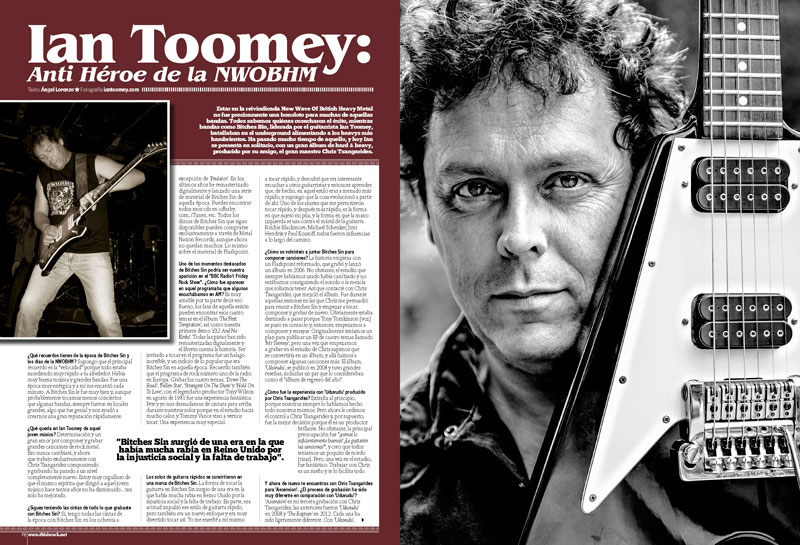

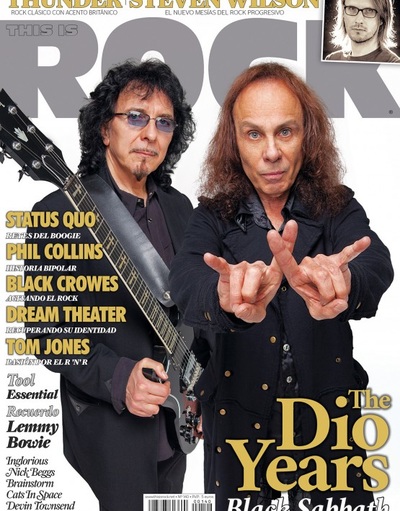
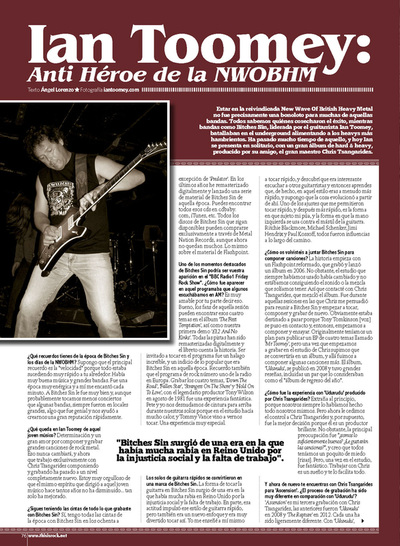
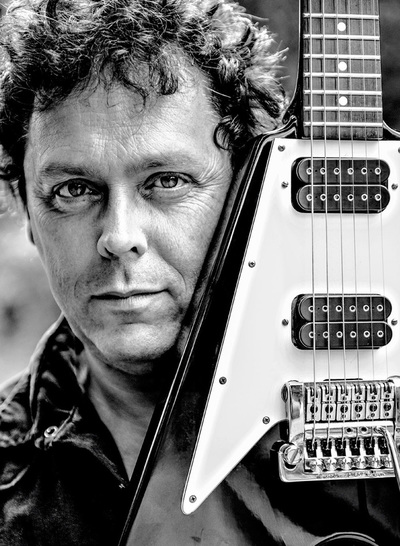
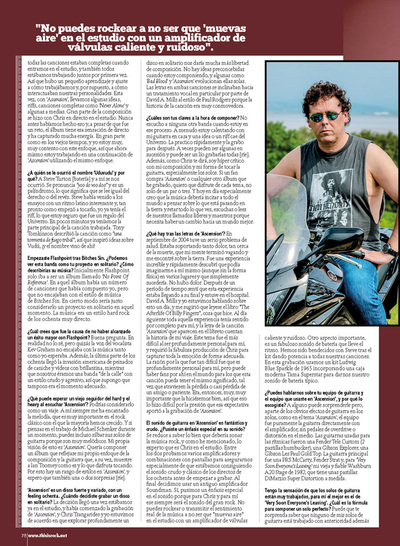
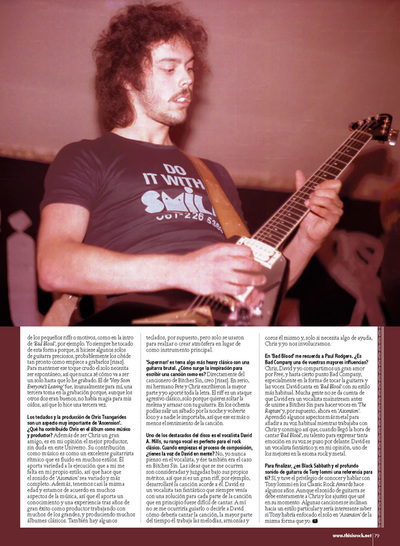
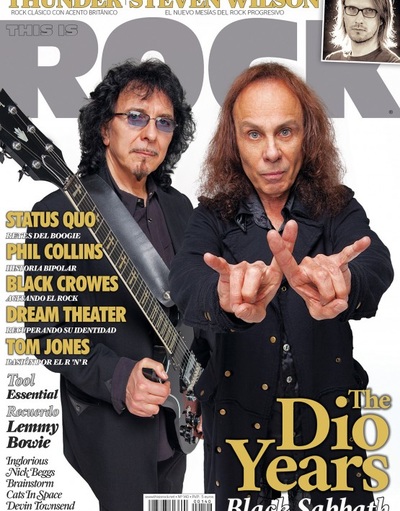
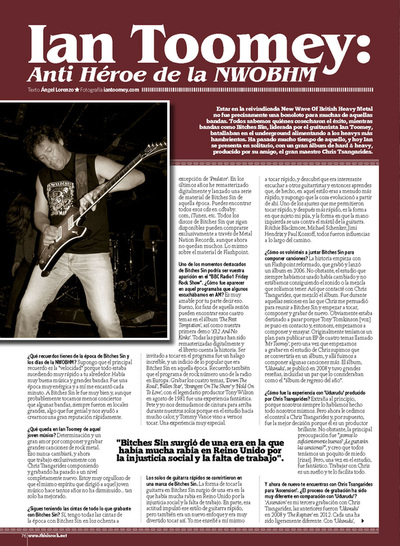
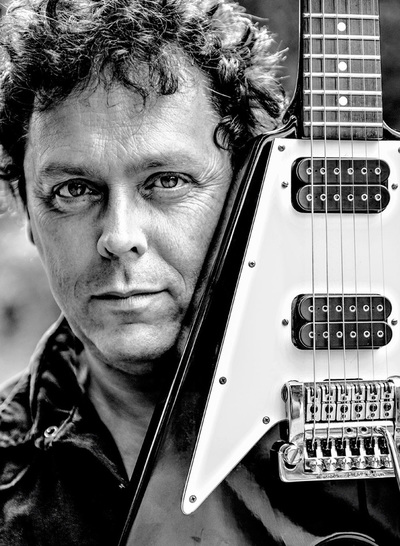
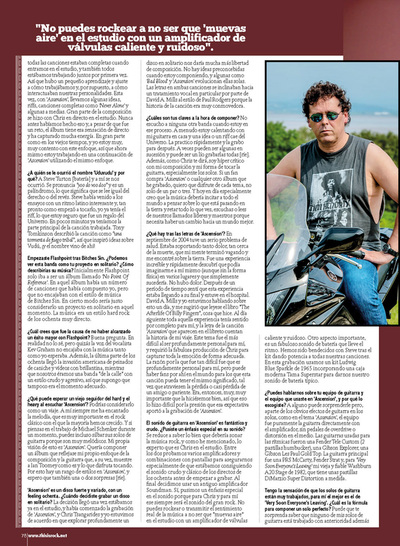
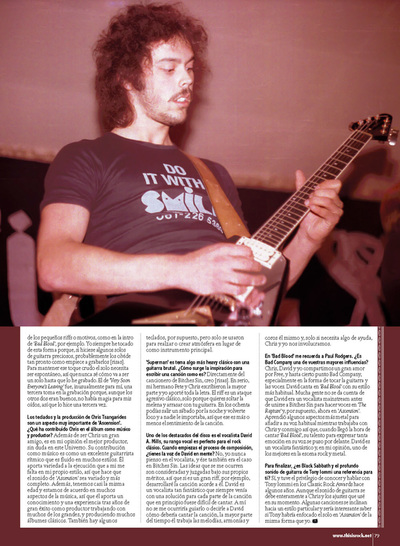
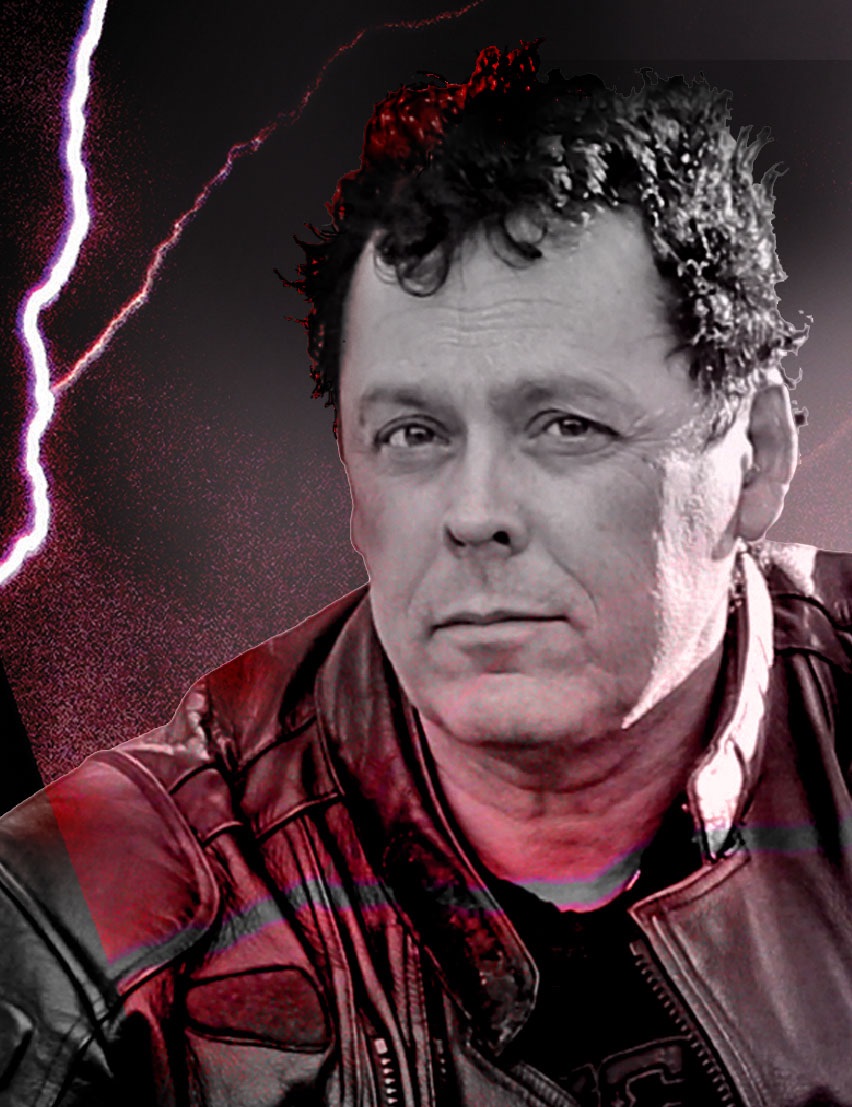
 RSS Feed
RSS Feed